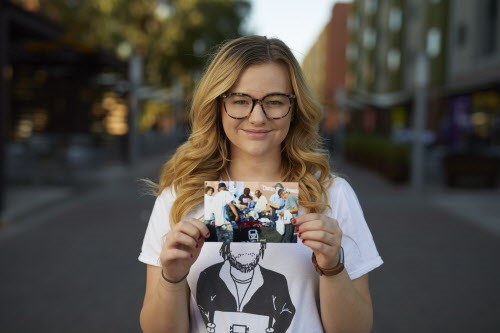People often hear the phrase “actions speak louder than words” and how it is a way of defining a person by what they do rather than their intentions. Similarly, walking the walk is tougher than talking the talk.
From the Grand Canyon University, Sydney Grover started her passion project to humanize the homeless and give them a chance to share their stories when others hold on to their prejudices and dismiss them.
Helping the homeless has been a passion of hers since she was eight years old. Now, at 20, she’s turned her project into a communal effort to make the homeless know they are part of the community.
Grover started her passion project when she was 18 because she was bored in her dorm room. She grabbed a camera and hit the streets, asking others to share their story.
Her first friend, Rocky, was the first of many that spared a story into a collective that is now a blog called “Can You Spare a Story?” With a title that mimics the phrase “Can you spare a dollar?,” Grover created a blog that is a collective of the stories she gathered from the streets of Tempe, Arizona.
While most students wish they could have time to themselves after a long week in class, Grover spends her free time building friendships with the homeless.
After her visit with Rocky, Grover realized that the work she collects could “genuinely help people out through this. I can work to end the negative stigma attached to homelessness.”
With “Can You Spare a Story?” reaching out to thousands of readers, Grover knows the negative stigma of homeless people breaks when she hears their change in routine.
Readers send messages to Grover about carrying extra clothes and water to give out to the homeless after reading the stories Grover shared from the streets of Tempe, Arizona. Her readers are now engaging in random acts of kindness towards the people they once avoided.
The stories Grover writes give a voice back to the homeless people. Grover builds a relationship with these people by going out on the streets with them, even taking a detour with her brother to drop off extra socks when the homeless ask for it. Grover becomes friends with the homeless after asking them to spare a story, and they end up talking for hours.
Furthermore, the charity does not end with Grover’s readers being mindful of the homeless they pass. The charity has extended to non-profit events that Grover named “The Priceless Pop-Up Shop,” which is a shopping experience for the homeless to come by and receive donated clothes and other essentials.
“I can work to end the negative stigma attached to homelessness,” says Grover.
The first pop-up shop was held on July 29, 2017, after Grover was going through her closet and was overwhelmed by the number of unused clothes she had and knew it could go towards something better.
She worked with her mother’s company (who knew her since she was young and her passion of helping the homeless) and with their help, they gathered about 400 bags of clothing to create a personalized shopping experience to make the homeless feel confident and at their best.
At her most recent pop-up shop, Grover reached out and helped 250 people get new clothes and essentials to carry on with their lives. Grover was relieved to see all her hard work go towards something worthwhile.
In the blistering, Nevada summer heat to the 32-degree winter, while those conditions are not easy to work in, Grover promises “It’s not that much for passion.”
At her recent pop-up shop, Grover met a woman named Melissa, who is in a group with other homeless women that support and keep each other safe. When Melissa came by to the pop-up shop in Dec. 2018, she was enthusiastic to share her story and even a photo to Grover, which surprised Grover since most women were not too enthusiastic to have their photo taken.
Melissa touched Grover’s heart because Melissa had just gotten a job and this pop-up shop was an opportunity for Melissa to get new clothes for the job. Furthermore, Melissa is part of a supportive group of women when as Grover said women are often ready to tear each other down instead of building each other up.
Grover’s time with Melissa also touches on a major prejudice people have towards the homeless. Everyone has heard the retort that the homeless should just get a job. Grover says it is not as easy as people think since their resources are stretched thin.
Time itself is valuable when all day is spent in line to get food. Personal hygiene is poorly maintained with just one pair of clothes, and there are no showers available.
Employers are reluctant to hire people who are consistently tardy. Homeless people have a harder time finding jobs than those who are fortunate to have homes, and Grover is happy to pull them back up on their feet for something better.
After all the positive work Grover has put into building a community, she still deals with the stinginess of others. She experienced people close to her laugh and ask “What do you get out of this?”
Thing is: it has never been about her. To Grover, “it’s the opportunity to really serve others when they are down and pull people up. That should be enough. You shouldn’t have to get paid for it.”

















